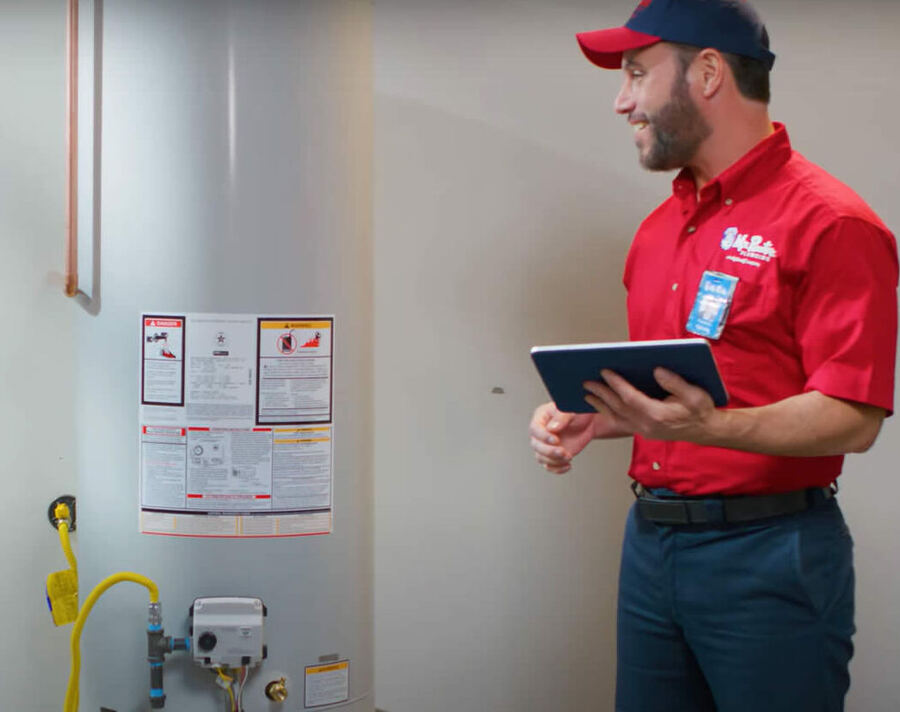Call This Saturday to Get $50 OFF
Call us Now to Get $50 OFF.
Ratings based on 6379 reviews
Local Plumbers, Local Reviews
Call This Saturday to Get $50 OFF
Call us Now to Get $50 OFF.
Ratings based on 6379 reviews
Local Plumbers, Local Reviews

The strong sulfur smell of gas is hard to miss. Sometimes it is noticeable as soon as you walk into a room, other times it builds slowly until you realize something is wrong. Natural gas is efficient and reliable, but when it leaks, it becomes a serious danger. A leak can lead to fire, explosion, or health problems. That’s why you should know exactly what to do in those first critical minutes before picking up the phone. Mr. Rooter Plumbing wants every homeowner to be confident and prepared. Taking the right steps before you call a plumber or request a plumbing repair service protects people and property.
Most people associate gas leaks with smell, and that’s for good reason. Utility companies add mercaptan to natural gas. On its own, natural gas is nearly odorless. With mercaptan, it smells like rotten eggs, which makes it much easier to detect. But smell isn’t the only clue.
Being aware of all these signs makes it easier to identify a problem early. Don’t brush off strange smells, noises, or sudden plant die-off. Treat every sign seriously.
Once you suspect gas is in the air, time matters. The most important step is to get everyone outside. Do not try to confirm the source. Do not wait to see if the smell fades. The risk is too high. Keep a few points in mind while evacuating:
It may feel inconvenient to leave everything behind, but nothing inside your house is worth risking your health or safety. Once everyone is outside and safe, you can start making the calls you need.
When you’re clear of the house, the first call should be to your gas utility provider. Nearly every provider operates an emergency response team for suspected leaks. Their crew will arrive with the equipment needed to shut off the supply and check whether gas is present. Next, call emergency services if the situation feels urgent. If you see flames, hear loud hissing, or feel lightheaded, don’t hesitate to dial 911. Firefighters and first responders are trained to handle gas emergencies and will secure the area. Once the immediate danger is under control, reach out to a local plumber for an inspection. If the problem traces back to your appliances or household piping, you’ll need professional repair. A gas line repair may be necessary before your home can safely use natural gas again. Getting help quickly reduces downtime and keeps your system running.
Gas lines are not like a leaky faucet or a slow drain. They should never be handled without specialized training. Even tightening a connector or adjusting a valve without proper tools can create sparks or worsen a leak. It might be tempting to try to solve small problems yourself, but this is one area where doing so can be dangerous. Some homeowners attempt to patch or seal small leaks with tape or glue. These are unsafe temporary fixes that won’t hold up under pressure. Natural gas needs to flow through sealed, tested piping. Anything less puts your home at risk. Always leave gas work to qualified professionals.
While no system is perfect, there are steps you can take to minimize the chance of a leak. Preventive care is the best defense.
Gas leaks can affect your health. Short-term exposure may cause fatigue, headaches, and dizziness. Long-term exposure in poorly ventilated spaces can be much more serious. In rare cases, it can lead to unconsciousness and fatalities. Children, the elderly, and pets are more vulnerable. If you’ve had prolonged exposure and feel unwell, seek medical attention. Don’t assume symptoms will go away on their own. Once the leak is fixed, ventilating the space thoroughly is also critical before moving back inside.
The smell of gas is never something to take lightly. Recognizing the signs, evacuating immediately, and calling the right people can prevent tragedy. Once the emergency crews and utility company have done their part, you’ll need a reliable plumber to inspect and repair your system. Whether you need a quick adjustment or a full gas line repair, you’ll know the work is done safely and correctly. At Mr. Rooter Plumbing, your safety comes first. Our team provides detailed inspections, plumbing repair service, and lasting solutions for every home. Call today to schedule an inspection or repair and protect your home from gas leaks.
When it comes to septic health, you can be one of those homeowners that try to do everything…
Read MoreMost pipes in a house can last anywhere between twenty and seventy years. So, what happens at the…
Read MoreOld houses have a charm that many new ones are never able to replicate. The entire atmosphere, the…
Read MoreMaintaining a septic system isn’t about preventing future backups but rather the costly repairs and replacements in the…
Read MoreA gas smell in the kitchen can seem harmless at first, but it is an early warning sign…
Read More